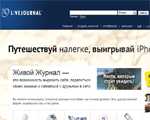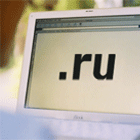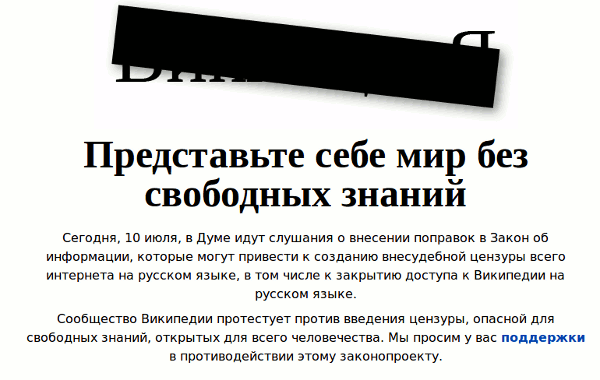18 Jul 2012 | Europe and Central Asia, minipost, News
 A court in Yaroslavl Oblast, Russia, has blocked [Ru] popular blogging platform LiveJournal after one page was accused of publishing “extremist” material. The ban, which will affect an estimated 60,000 Livejournal account holders in the region, and their readers, has been opposed by internet service providers and Roskomnadzor, the federal telecommunications regulator.
A court in Yaroslavl Oblast, Russia, has blocked [Ru] popular blogging platform LiveJournal after one page was accused of publishing “extremist” material. The ban, which will affect an estimated 60,000 Livejournal account holders in the region, and their readers, has been opposed by internet service providers and Roskomnadzor, the federal telecommunications regulator.
13 Jul 2012 | Europe and Central Asia, News
 Russian parliamentarians have passed legislation that will establish a central register of banned websites. The new laws are ostensibly designed for child protection, but Andrei Soldatov says the real aim is to take control over the country’s burgeoning social networks
Russian parliamentarians have passed legislation that will establish a central register of banned websites. The new laws are ostensibly designed for child protection, but Andrei Soldatov says the real aim is to take control over the country’s burgeoning social networks
(more…)
10 Jul 2012 | Digital Freedom, Europe and Central Asia, Index Index, News
Russia’s Wikipedia and LiveJournal blacked out today to protest a draft law that would allow websites that promote drugs, suicide or contain contain porn or “extremist” materials to be blacklisted without judicial oversight. Activists fear the powers will be abused for political purposes.
Index on Censorship CEO Kirsty Hughes said today:
The Bill currently passing through the Duma is aimed squarely at clamping down on online dissent. The law will force ISPs to install filters at huge cost to prevent access to websites that the Communications Regulator deems “extremist”, with no judicial oversight. With Compromat.ru, a site exposing regime corruption targeted by the Moscow prosecutor last week, it’s clear that in Putin’s Russia freedom of expression is in decline.
10 Jul 2012 | Europe and Central Asia, News
A draft law is set to create a digital blacklist of Russian websites which promote drugs or suicide or contain contain porn or “extremist” materials.
The draft law would allow websites to be blacklisted without judicial oversight — it merely requires law enforcement authorities to notify a hosting and/or telecom access provider. The provider then informs the website owner they must delete the controversial content, if the content is not removed within 24 hours the provider blocks not just the URL of the particular material but the whole website’s IP address and domain name. If the provider doesn’t block the website, it shares responsibility with the website’s owner.
Because it was composed by senior officials from the four major political parties, the draft law is likely to be passed quickly. The legislation’s authors insist it will protect children, but human rights activists see it as an attempt to censor a segment of the Russian internet and fear it will be used to threaten political protest.

Russian-language Wikipedia has been blocked in protest of the draft law
“As a rule limitations and censorship are imposed under the pretence of protecting children,” Andrei Soldatov, editor-in-chief of website Agentura.ru and an expert on Russia’s intelligence services told Index. “Hosting and telecom access providers will have to buy special blocking equipment, which can later be used anything the state wants to block.”
Russia’s Presidential Rights Council has published a brief analysis saying:
Legal users are likely to suffer mass blockings, because tough restrictions will be based on subjective criteria, which makes Russian jurisdiction highly unattractive for Internet business.
The councils experts went on to say:
The draft law doesn’t imply possibilities to review the decision about website’s URL and DNS blocking and to prove it wrong, so its difficult to interpret such blocking as anything, but actual censorship.
Ever since Vladimir Putin came to power extremism legislation, together with drug and defamation laws, have been used to silence the Kremlin’s critics. Human rights activists fear this new blacklist will also be abused for political purposes.
Activists see it as a third legislative response to the huge anti-Putin protests staged over recent months. Two other new laws passed since Putin’s return to the Presidency toughened fines for breaking the rules on holding rallies, and targeted NGOs that receive overseas financing.
The first hearing on the blacklist law will be held this week, it will provoke street protest but activists know they are unlikely to influence the Duma, lawmakers are also unmoved by a new UN resolution condemning attempts to limit freedom of expression on the internet.
Kirsty Hughes, Chief Executive of Index on Censorship said:
The Bill currently passing through the Duma is aimed squarely at clamping down on online dissent. The law will force ISPs to install filters at huge cost to prevent access to websites that the Communications Regulator deems “extremist”, with no judicial oversight. With Compromat.ru, a site exposing regime corruption targeted by the Moscow prosecutor last week, it’s clear that in Putin’s Russia freedom of expression is in decline.
 A court in Yaroslavl Oblast, Russia, has blocked [Ru] popular blogging platform LiveJournal after one page was accused of publishing “extremist” material. The ban, which will affect an estimated 60,000 Livejournal account holders in the region, and their readers, has been opposed by internet service providers and Roskomnadzor, the federal telecommunications regulator.
A court in Yaroslavl Oblast, Russia, has blocked [Ru] popular blogging platform LiveJournal after one page was accused of publishing “extremist” material. The ban, which will affect an estimated 60,000 Livejournal account holders in the region, and their readers, has been opposed by internet service providers and Roskomnadzor, the federal telecommunications regulator.

